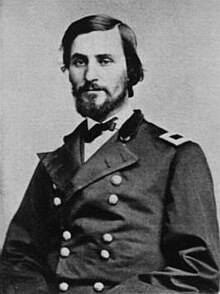William Sooy Smith
| William Sooy Smith | |
|---|---|

William Sooy Smith
|
|
| Born |
July 22, 1830 Tarlton, Ohio |
| Died | March 4, 1916 (aged 85) Medford, Oregon |
| Place of burial | Forest Home Cemetery Forest Park, Illinois |
| Allegiance |
United States of America Union |
| Service/branch |
United States Army Union Army |
| Years of service | 1853–1854; 1861–1864 |
| Rank |
|
| Commands held |
13th Ohio Infantry Regiment 1st Division / XVI Corps Cavalry / Mil. Div. of the Mississippi |
| Battles/wars | |
William Sooy Smith (July 22, 1830 – March 4, 1916) was a West Point graduate and career civil engineer who became a major general in the Union Army during the American Civil War.
In civilian life, he was a renowned engineer involved in bridge construction that included the building of the first large all steel bridge in the world.
Smith was born in Tarlton, Ohio, and graduated from Ohio University in 1849 with an engineering degree. He furthered this degree at West Point as soon as he left the university, graduating sixth in his class from the U.S. Military Academy in 1853. Smith resigned from the Army on June 19, 1854 to accept a position with the Illinois Central Railroad.
Smith established the engineering company Parkinson & Smith in 1857, and was involved in the first surveys for a bridge between the United States and Canada across the Niagara River near Niagara Falls.
In 1861 at the outbreak of the Civil War, Smith joined the 13th Ohio Infantry, and by June he was commissioned as its colonel. After serving in western Virginia, he was promoted to brigadier general (volunteers) in April 1862 during the Battle of Shiloh. Smith participated in the Vicksburg campaign, commanding the XVI Corps' first division.
...
Wikipedia
